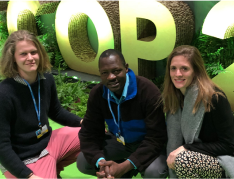
Published: JANUARY 01, 2021
CAN TZ is attending The UN Climate Change Conference (COP25) in Madrid, Spain. CAN TZ’s goal is to be the voice of Tanzania’s civil society and promote immediate action regarding loss and damage, climate finance and clean energy.
While many climate experts believe that cities are the pioneers of the renewable energy transition, CAN TZ’s director Dr. Mwanga believes that the best entry point for renewables in Tanzania and many other developing countries lies within the rural areas. The majority of Tanzanians (about 75%) live in rural areas and are dependent on natural resources with limited social services. Mobilising civil society in these communities to push for the electrification of living environments is seen as an essential first step in the transition to 100% renewable energy in Tanzania. With over 80% of the rural population having no access to affordable, reliable and modern energy, renewable energy has the potential to unlock energy poverty in rural areas of Tanzania while enhancing provision of social services such as education, water, sanitation, healthcare, irrigation, communication and improving living standards through job creation for women and youth.
It is a race against time, for immediate climate action and towards increasing climate resilience.
129 countries have incorporated renewable energy approaches into their National Determined Contributions (NDCs) – which outline a country’s climate actions and solutions. Article 6 of the Paris Agreement supports collaboration between industrial and developing countries as a way of successfully implementing NDCs. It is therefore essential to include and strengthen the strategy for the transition to 100% renewable energies in the National Adaptation Plan. However, in order to successfully integrate renewable energies into the climate adaptation strategy for its NDCs, Tanzania will need support from the international community and relevant funding such as the Green Climate Fund.
Rural communities should be brought at the center of NDCs and necessary efforts to access and increasing required financial resources should be put in places as soon as possible. Those are often the ones that are most vulnerable to either slow-onset climate or extreme weather events or both. There is less than one year left until the review of the NDCs at COP26 in Glasgow. It is a race against time, for immediate climate action and towards increasing climate resilience.
Evidence-based information needed to influence decision-makers on renewable energies
Dr. Mwanga emphasizes that due to limited financial resources and long term plannings, there is a lack of data and evidence-based information that supports the importance of transitioning to 100% renewable energies in Tanzania. Without such vital evidence and data on the type, quantity and quality of energy needed, influencing decision-makers becomes very difficult. Specifically, data on the financial benefits of transitioning to renewables is needed. Data on the benefits for the economy and financial incentives, rather than the development of a country, in general, is most powerful when influencing decision-makers. Only with this will a transition to renewable energy be a serious consideration. This is a call for enhanced international collaboration to ensure the availability of downscaled data and information.
Renewable energy has high potential to contribute to poverty reduction and increase clean energy access
The utilization and implementation of renewable energy strategy can stimulate the whole socio-economic ecosystem in Tanzania.
It reduces dependencies of expensive and imported fossil fuels, builds sustainable livelihood opportunities and protects populations from shocks related to resource shortages while strengthening national currency. It can contribute to overall poverty reduction, increase jobs for youth and women and help to increase clean and affordable energy access. RE-Electrifying the Tanzanian population can also help achieve a number of sustainable development goals, such as #: 1, 2, 3, 4, 5, 6, 7, 8, 9, 13 and 17. A transition to 100% renewable energy also contributes and fastrack Tanzania’s long-term goal to become a middle-income country by 2025.
It is time to take concrete action towards providing a climate-friendly energy supply that is inclusive of all communities in Tanzania, including those in rural areas where the majority of Tanzanians live. In order to achieve this goal, immediate support in energy financing and consultancy for data provision is urgently needed in Tanzania.
